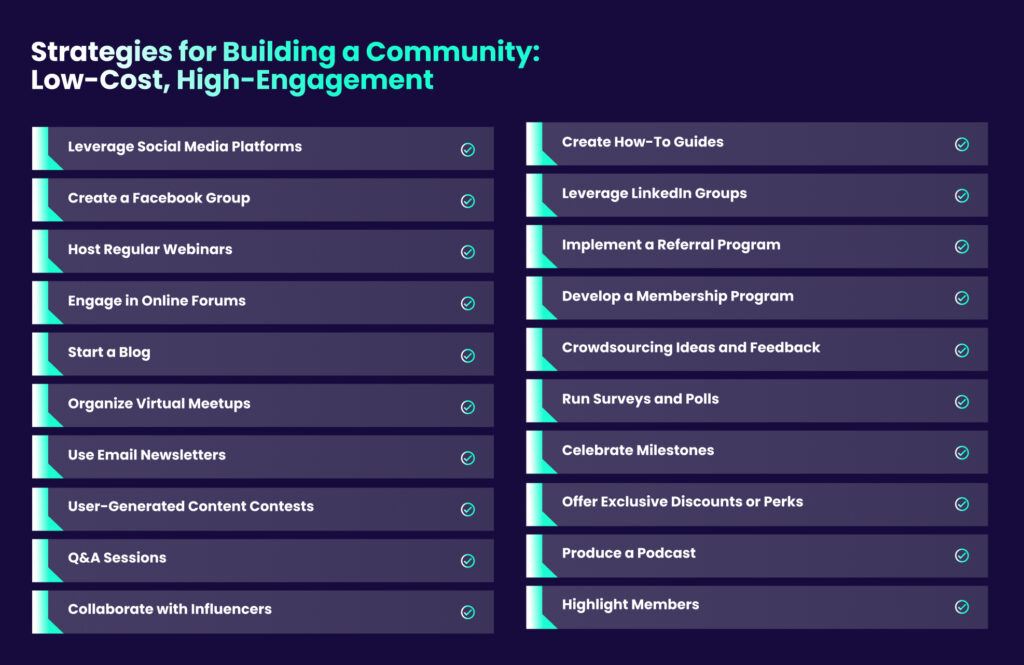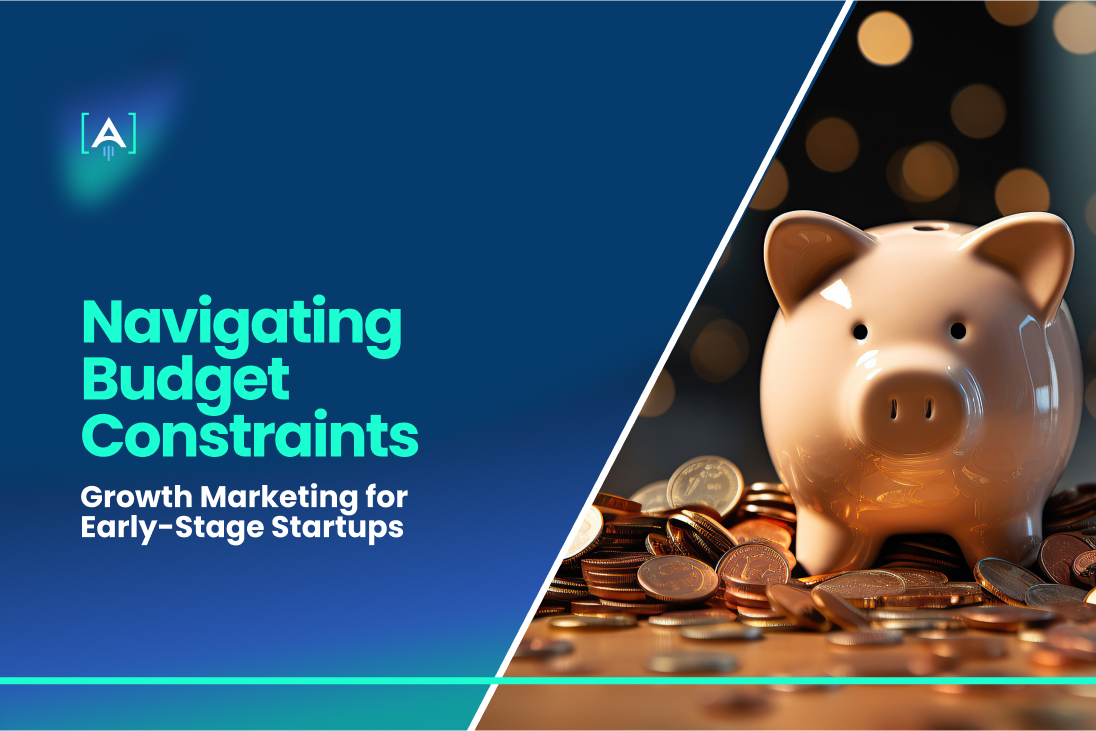Starting a business is an exhilarating journey, but the road has its financial bumps, especially for early-stage startups.
Early-stage startups often need more financial resources. From covering operating expenses and fixed costs to scaling startup marketing efforts, the challenges are diverse and demanding. But fear not, as solutions are at hand.
Enter growth marketing for startups, a dynamic approach tailored for startup growth, without breaking the bank.
Growth marketing thrives on creativity, innovation, and strategic planning to maximize impact without draining your financial reservoirs.
In navigating startup budget constraints, consider Azarian Growth Agency as more than a growth marketing agency for startups – it’s your growth partner.
With a proven track record of empowering businesses, we bring expertise and insights. This is not just a service; it’s a collaborative journey toward success.
So, how can a growth marketing agency for startups become the tool to manage your expenses more efficiently?
In a 2023 survey, some businesses that used growth marketing techniques in 2022 grew their revenues by 8% despite economic downturns.
This guide will delve into navigating budget constraints while supercharging your startup’s growth through savvy marketing techniques.
Let’s dive in!
Defining Growth Marketing in the Startup Ecosystem

Growth marketing for startups emerges as a strategic powerhouse, distinct from traditional marketing approaches.
Let’s see what growth marketing for startups means and illuminate the significant contrasts it holds with traditional marketing:
Growth Marketing in Startup Context
- Holistic Approach: Growth marketing for startups is more than just acquiring new customers; it’s about fostering sustained and scalable growth across all facets of a startup. This holistic perspective is where growth marketing consultants at growth marketing agencies can be invaluable, offering expert guidance to navigate the complexities of the startup landscape.
- Iterative Optimization: Unlike traditional marketing’s one-size-fits-all approach, growth marketing thrives on constant iteration and optimization based on real-time data and user feedback. A growth marketing consultancy can provide the data-driven insights necessary to drive this iterative process.
- User-Centric Focus: Startups adopting growth marketing strongly emphasize understanding and addressing user needs. It’s about building a customer base and a community of loyal advocates.
Contrast with Traditional Marketing
Objective Orientation
- Traditional Marketing: Focuses primarily on short-term objectives like immediate sales.
- Growth Marketing: A growth marketing agency for startups prioritize growth mindset, long-term, sustainable growth and user engagement.
Channel Utilization
- Traditional Marketing: Relies heavily on traditional channels such as TV, radio, and print.
- Growth Marketing: Leverages a diverse set of channels, including digital platforms, social media, and innovative guerrilla tactics.
Feedback Integration
- Traditional Marketing: Often lacks immediate feedback loops, making it challenging to adapt strategies swiftly.
- Growth Marketing: Embraces data-driven decision-making, integrating user feedback promptly to refine growth marketing solutions in real time.
Customer Acquisition vs. Retention
- Traditional Marketing: Primarily focused on customer acquisition.
- Growth Marketing: Balances acquisition with a strong emphasis on customer retention and lifetime value.
Understanding these distinctions is pivotal for startups aiming for initial success and sustainable growth in the competitive business landscape.
Startups should carefully evaluate their resources, expertise, and budget constraints when considering an in-house marketing team or a growth marketing agency. To ensure a successful partnership, they must know essential questions to ask a growth agency. A well-defined marketing agency onboarding process can help streamline collaboration and maximize results. A growth marketing team is agile and user-centric, making it a tailored fit for startups seeking to thrive and evolve.
Cost-Effective Growth Marketing Strategies for Early-Stage Startups

Here are some strategies growth marketing managers typically use so that your essential startup costs remain under control:
Content Marketing Excellence
- According to a HubSpot study, 80% of marketers are investing in content marketing. Ensure the development of a content strategy that emphasizes value and relevance to the target audience.
- Invest in professional freelancers or content creators to develop high-quality articles, infographics, or videos. Repurpose existing content across multiple platforms to maximize reach without incurring extra business startup costs.
Social Media Optimization
- Focus on select social media platforms where the target audience is most active. For instance, as of January 2023, men between 25 and 34 comprise Facebook’s largest audience.
- Invest in creating visually appealing content in-house or through freelance designers. Use affordable scheduling tools to plan and automate posts, ensuring a consistent and engaging social media presence without needing a dedicated social media team.
Email Marketing Efficiency
- Develop a more segmented email list based on customer preferences and behaviors. Craft compelling, personalized email campaigns with clear calls to action to drive engagement and conversions. Utilize free or low-cost email automation tools to streamline communication.
Search Engine Optimization (SEO)
- Conduct keyword research using accessible or affordable SEO tools to identify relevant terms for your industry. Optimize website content, meta tags, and images based on these keywords.
- Regularly update and add more fresh content to your site to improve search engine rankings organically. Consider low-cost SEO audits or services for technical optimization.
Community Engagement and User Forums
- Foster community engagement by creating user forums or online communities related to your industry. Actively participate in discussions, address user concerns, and encourage sharing experiences.
- Join platforms like LinkedIn or create a YouTube channel providing important product release information or user guides.
Tips for Effective Optimization
To maximize the impact of your growth marketing for startups, it’s essential to continuously optimize your strategies. By focusing on data-driven insights and refining your approach, you can achieve better results and drive sustainable growth. Here are some key areas to concentrate on:
Keyword Research and Integration (SEO)
Understand User Intent: A growth marketing agency for startups conducts very thorough keyword research to understand what exactly your target audience is searching for. Then they integrate these keywords seamlessly into your website content, ensuring alignment with user intent.
Consistent and Valuable Content (Content Marketing)
Frequency and Relevance: Consistency is key in content marketing for startups. Develop a content calendar and stick to it. Provide valuable, relevant content that resonates with your audience’s needs and interests. Quality over quantity is the mantra.
Engagement and Community Building (Social Media)
Authentic Interactions: It’s not just about posting content; it’s about engaging with your audience authentically. Respond to comments, ask questions, and participate in discussions. Building a community takes time but pays off in organic reach and brand loyalty.
Data-Driven Refinement
Analytics Insights: Leverage analytics tools to gather insights into the performance of your organic channels. Understand what works and what doesn’t. Use these insights to refine your strategies, whether it’s adjusting keywords, tweaking content themes, or optimizing social media posting times.
Importance of Creativity and Innovation in a Constrained Budget Scenario

Here’s how to foster creativity and innovation in a constrained budget scenario:
Dare to Be Different
Challenge Assumptions: Break free from industry norms and challenge assumptions. What worked for others may not be the ideal path for your startup. Think outside the box and embrace innovative marketing strategies.
Embrace Guerrilla Tactics
Low-Cost, High-Impact: Guerrilla marketing involves unconventional, budget-friendly methods that rely on creativity. Think viral stunts, unique partnerships, or eye-catching street campaigns. These tactics often generate buzz without the need for significant financial investment.
Leverage User-Generated Content
Turn Users into Advocates: Encourage your users to create content related to your product/service. User-generated content not only saves on production costs but also turns your user base into brand advocates. This organic approach is authentic and resonates with potential customers.
Repurpose and Recycle Content
Instead of constantly creating new content, maximize the value of existing assets. Repurpose blog posts into infographics, podcasts, or short videos. This approach saves time and extends the lifespan of your content across various channels.
Engage in Collaborative Marketing
Collaborate with other startups or businesses that share a similar target audience. Pool resources for joint marketing campaigns, events, or promotions. This collaborative effort allows you to reach a broader audience without a hefty financial commitment.
Harness the Power of Social Media Challenges
Launching a creative challenge on social media platforms can trigger a viral response. Encourage users to participate and share their experiences. These challenges can generate organic engagement and visibility.
Participate in Niche Communities
Identify and participate in niche communities related to your industry. Engage in discussions, offer valuable insights, build relationships, and apply personalized marketing. Word-of-mouth within these communities can be a powerful and cost-effective growth driver.
Focus on Storytelling
Craft compelling narratives around your brand. Share stories of your journey, successes, and challenges. Storytelling builds emotional connections with your audience, making your brand memorable and shareable.
The Role of Data in Budget-Conscious Marketing

Let’s delve into how data is pivotal for a growth marketing agency for startups in allocating budgets wisely and prioritizing strategies effectively.
Guiding Budget Allocation
Identifying High-Impact Channels
Data Analysis: Analyze data to identify the channels that yield the highest returns. Whether it’s through conversion rates, customer acquisition costs, or engagement metrics, data helps pinpoint where your efforts are most effective. Allocate a significant portion of your budget to high-impact channels for optimal results.
Understanding Customer Lifetime Value (CLV)
Predictive Metrics: Utilize data to understand the lifetime value of your customers. By predicting the long-term revenue a customer is likely to generate, you can allocate budget resources more effectively. Prioritize channels and strategies that contribute to a higher CLV.
Testing and Iteration
A/B Testing: Employ A/B testing methodologies to experiment with different approaches. Whether it’s ad creatives, email subject lines, or landing page layouts, data from A/B tests can reveal what resonates best with your audience.
This iterative process ensures that budget allocations align with proven, data-backed strategies.
Collecting and Analyzing Relevant Data
Customer Surveys and Feedback
Direct Insights: Engage with your audience through surveys and feedback mechanisms. Direct insights from customers provide valuable qualitative data. Understand their preferences, pain points, and expectations.
This qualitative data complements quantitative metrics, offering a holistic view of strategic decision-making.
Website and Social Media Analytics
User Behavior Tracking: Leverage tools like Google Analytics to track user behavior on your website. Understand which pages are most visited, where users drop off, and what content resonates.
Similarly, delve into social media analytics to gauge engagement, audience demographics, and the impact of your social campaigns.
Sales and Conversion Data
Funnel Analysis: Map out your sales funnel and analyze data at each stage. Identify bottlenecks, drop-off points, and conversion rates.
This quantitative data is instrumental in optimizing your sales processes and understanding where budget adjustments may be needed for maximum impact.
Data empowers startups to make informed decisions, ensuring that every budgetary allocation contributes to measurable outcomes.
Building a Community: Low-Cost, High-Engagement

Strategies for Community Building and Engagement
Online Forums and Groups
Establish online forums or groups centered around your industry. Encourage discussions, share insights, and foster a sense of community. Platforms like Reddit or specialized forums provide low-cost spaces for engagement.
Interactive Content
Craft interactive content such as polls, quizzes, and challenges. These not only boost engagement but also create a participatory environment. Interactive content can be shared across social media platforms, extending its reach organically.
Regular Virtual Events
Host regular virtual events like webinars or Ask Me Anything (AMA) sessions. These events facilitate direct interaction with your audience, fostering a sense of connection. Virtual events are cost-effective and offer a platform for sharing valuable insights.
Examples of Successful Community-Driven Growth Tactics
Slack Communities
Many startups create Slack communities for real-time collaboration and communication. These communities provide a space for users to connect, share ideas, and seek assistance. The organic growth within Slack communities often translates into brand advocacy.
User-Generated Content Campaigns
Launch campaigns encouraging users to generate content related to your brand. Whether it’s photos, videos, or testimonials, user-generated content creates a sense of belonging and serves as authentic marketing material.
Exclusive Membership Clubs
Establish exclusive membership clubs or loyalty programs. Offer perks, early access to products, or special discounts to members. This sense of exclusivity encourages community members to engage and stay connected actively.
Harnessing the Power of Partnership and Collaboration

Benefits of Partnerships and Collaborations
Extended Reach
Partnerships allow startups to tap into each other’s audiences. This extended reach provides exposure to a broader demographic without the need for extensive marketing budgets.
Resource Sharing
Collaborations enable the sharing of resources, skills, and expertise. Whether it’s joint marketing campaigns, shared events, or co-created content, startups can achieve more together than individually.
Credibility Boost
Associating with reputable partners enhances your startup’s credibility. The trust established by your partner extends to your brand, fostering a positive perception among shared audiences.
Identifying and Approaching Potential Partners
Aligning Values
Identify partners whose goals and values align with your startup’s mission. This alignment forms a solid foundation for a mutually beneficial partnership.
Research and Outreach
Conduct research to find potential partners within your industry. Outreach can be through direct communication, networking events, or leveraging professional platforms.
Proposal and Collaboration Outline
When approaching potential partners, clearly outline the benefits of collaboration. Present a comprehensive proposal highlighting how the partnership can be a win-win scenario for both parties.
Preparing for Growth: When to Scale Your Marketing Efforts

Recognizing the right time to hire a marketing agency and having a readiness checklist are fundamental steps.
Recognizing the Right Time
- Consistent Positive Metrics: If your tracking and analytics consistently show positive results, it may be the right time to consider scaling. Look for sustained growth in conversion rates, decreasing CAC, and increasing ROI. A growth marketing agency for startups can help you optimize these metrics further.
- Customer Demand: Increased demand for your product or service is a strong indicator. If your startup is consistently meeting or exceeding capacity, it’s a sign that scaling marketing efforts can meet growing demands. A growth marketing for startups strategy can be instrumental in capitalizing on this increased demand and driving sustainable growth.
Signs of Readiness for Scaling
- Operational Efficiency: Ensure your operations can handle increased demand. Scaling marketing efforts without operational readiness can lead to inefficiencies.
- Budget Allocation: Allocate a proportionate budget for scaling efforts. It’s crucial to have the financial resources necessary for expanded marketing initiatives.
- Diversified Channels: If your startup has successfully diversified its marketing channels and sees positive results from each, this readiness suggests a robust foundation for scaling.
Partner with Azarian Growth Agency for Your Startup’s Success

Navigating startup budget constraints while pursuing robust growth demands strategic and cost-effective approaches.
You’d want to make sure to cover expected business costs with a positive cash flow.
As you embark on your journey, consider partnering with a reliable, experienced agency to amplify your growth efforts.
Azarian Growth Agency stands out as a trustworthy partner for startups seeking expert guidance in navigating the intricacies of growth marketing.
Partner with us and turn your limitations into a tangible pathway to success!

